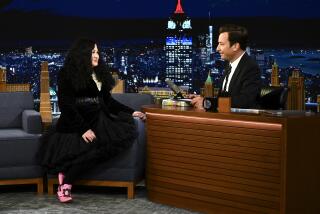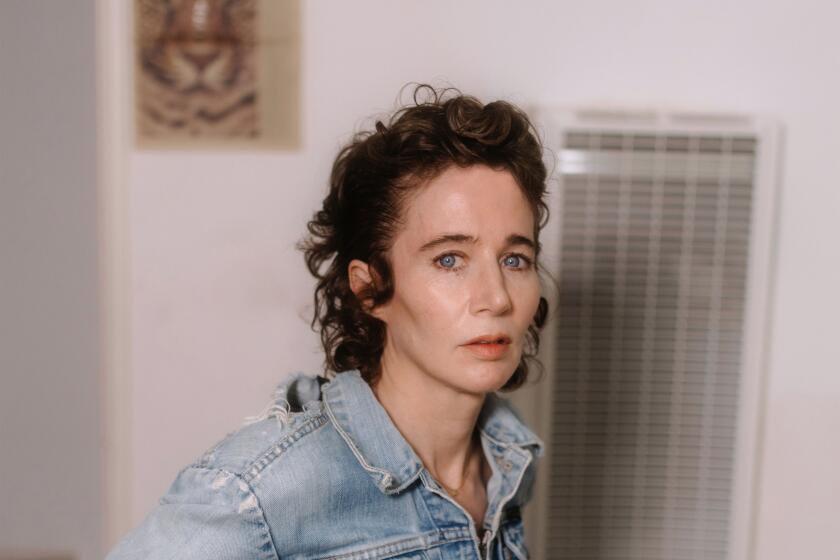Literary elite? Not with Elmo
Actress Kim Cattrall, celebrity chef Rocco DiSpirito and Elmo may not be whom you’d expect to find handing out awards at a national book prize ceremony. But then again, the Quill Awards are designed to be anything but your average literary contest. “Today” show weatherman Al Roker conducted red carpet interviews with guests as they arrived for the Oct. 11 black-tie ceremony at the Chelsea Piers. Swelling orchestral music accompanied the recitation of nominees, and the beaming winners thanked their agents.
In short, the Quills resembled a Hollywood awards show -- which is exactly what organizers were aiming for.
Reed Business Information, which puts out Publishers Weekly, launched the contest this year as the first “People’s Choice” of book awards, seeking to bridge the elite realm of literary prizes and the commercial realities of publishing. Instead of enlisting writers or book critics to judge the year’s best works, the public was asked to vote for favorites online, choosing from a list that varied from romance novelist Nora Roberts to Pulitzer Prize winner Philip Roth. Not surprisingly, mass appeal won out; the prize for the best book of the year went to J.K. Rowling for her latest installment in the “Harry Potter” series.
The goal, as the Quills website put it, was to “pair a populist sensibility with Hollywood-style glitz to become the first literary prizes to reflect the tastes of the group that matters most in publishing -- readers.”
But the Quills were created to do more than acknowledge consumer taste. Backers of the awards, which include many of publishing’s heavyweights, wanted the prizes to generate buzz and, ideally, sales. After all, what good is “Hollywood style glitz” without an audience? The final piece of the puzzle was to get the show on television.
So Gerry Byrne, a former Variety publisher who was drafted by Reed to organize the Quills, persuaded NBC Universal to air the program, albeit in a limited fashion. Tonight at 7, viewers will have the chance to see an hourlong truncated version of the ceremony hosted by NBC anchor Brian Williams with appearances by comedians Jon Stewart, whose book “America (The Book): A Citizen’s Guide to Democracy Inaction” won two Quills, for best audiobook and best humor book, and Robert Klein, who recently published a memoir, “The Amorous Busboy of Decatur Avenue.” But the show will not be available everywhere. It will air on the 14 local NBC-owned stations, including Los Angeles’ KNBC, and reach about 30% of the country and cover all major markets except Boston. Another 14 NBC affiliates in smaller markets, such as Topeka, Kan., and Duluth, Minn., have committed to airing the show at some point this fall.
In its first year, the Quills didn’t come close to the Oscars in the glamour department. There were no A-list celebrities in attendance; viewers will have to settle for actors like Cattrall and Matthew Modine, who both have their own books to promote. But supporters believe that the ceremony made some progress in jazzing up publishing’s staid reputation.
“We can’t ignore the fact that books compete with all different kinds of entertainment media,” said Larry Kirshbaum, chairman of Time Warner Book Group and a member of the Quills executive council, which also included executives from HarperCollins, Random House and Simon & Schuster. “I think we all see a trend that book sales have flattened out over the last few years, and we’re trying to get some of that Hollywood glitz to reinforce the idea that reading is fun, as well as fundamental.”
But it remains to be seen whether viewers will tune in -- and, more broadly, what kind of influence the Quills will have on sales and the image of the book publishing industry.
Even NBC, which lent its talent and airtime for the program, doesn’t seem convinced that the awards will be a major draw. Jay Ireland, president of NBC Universal Television Stations, said he decided to televise the show largely because the Quills set up a companion foundation to support literacy efforts.
“We’re not trying to make the show compete with the Emmys and the Oscars,” said Ireland, who acknowledged that a Saturday evening isn’t the best time slot to get a large audience. “The main reason we like it is for the literacy program. What we try to do at the stations is to be as connected to our community as possible.”
Many in the book world are also skeptical that the Quills will generate public enthusiasm for the books it is honoring, despite its populist tone. Most of the winners -- like Sue Monk Kidd’s “The Mermaid Chair,” “Freakonomics: A Rogue Economist Explores the Hidden Side of Everything” by Steven D. Levitt and Stephen J. Dubner, and David McCullough’s “1776” -- have already made the bestseller lists.
“I think it’s really going to be difficult to get people riled up about what is essentially a popularity contest,” said Benjamin Schwarz, Atlantic Monthly’s literary editor. “Those books are already getting a lot of attention.”
Dennis Loy Johnson, publisher of Melville House Publishing, a small independent press based in Hoboken, N.J. summed it up this way: “Why bother? Did J.K. Rowling need an award?”
Some critics questioned the notion that the public even wants the opportunity to pick the year’s best books, noting that many are overwhelmed by the thousands of new titles every year -- witness the hosannas that greeted Oprah’s recent decision to resume picking out contemporary books for her viewers to read. Most casual readers, Quills organizers admitted, probably did not have time to peruse the 95 titles in 19 categories that made up the final list of nominees.
“People let awards lead them to the books they want to read,” said Laura Miller, staff book critic for Salon.com. “They may be frustrated by the choices, but that doesn’t necessarily mean they want to make choices themselves.”
In fact, it’s unclear how many people actually participated in selecting the Quill winners. Organizers would not reveal how many people voted, saying they were following the practice of other award shows, such as the Oscars, that keep the number of ballots confidential. According to comScore Networks, which tracks Internet traffic, during the monthlong voting period, the Quills voting website drew fewer than 25,000 unique users a week, the minimum amount of activity required to track visitors on a site.
Byrne discounted that figure as “ridiculous,” insisting that the site got more than that per week. “We had great national coverage in terms of the amount of voting,” he said.
The Quills were definitely not short on participation from the book industry. Barnes & Noble and Borders advertised the contest with special display tables in their stores, as did many independent bookshops around the country.
“Anything that promotes awareness for reading and books is certainly a great thing for the industry,” said Mike Spinozzi, chief product officer for Borders, which configured its in-store kiosks to allow Quills voting by customers.
Antoinette Ercolano, Barnes & Noble’s vice president for trade book buying, said that the chain did see an uptick in the sales of Quills-nominated books.
“But it’s difficult to tell for sure what the driver was, whether it was the display or something else,” she said. “Many were already popular titles.”
The Quills come a year after the jury for the National Book Awards drew criticism for selecting five little-known female authors, all living in Manhattan, as its fiction finalists. This year, the finalists for that award, whose winners will be announced next month, include prominent authors E.L. Doctorow and Joan Didion. Even so, Harold Augenbraum, executive director of the National Book Foundation, said that one of the roles of book prizes is to expose readers to great writing, no matter how obscure.
“I don’t think there’s anything wrong with recommending to people who read more popular literature, ‘Try this. It’s accessible, it’s readable and it will challenge you a bit,’ ” he said. “Why not the best? Someone really should be recommending the really, really top-notch stuff.”
But industry executives who backed the Quills said the traditional literary contests are often out of touch with consumers.
“I got involved because I thought this was a real chance to present a people’s choice awards that would resonate with the real readers of books, as opposed to an elitist literary prize that really affects only a small percentage of our readers,” Kirshbaum said. “I’m not disputing the importance of literary books, but at some point you have to recognize that readers matter, and the books that they really like should be recognized. Why shouldn’t ‘Harry Potter’ be recognized as the best book of the year?”
Tara O’Donnell agrees. A floor manager at an independent Manhattan bookstore who writes about books on her blog Living Read Girl, she was one of 6,000 booksellers and librarians invited to nominate titles for the Quill awards. The top five books in each category were then voted on by the public between Aug. 15 and Sept. 15.
“I liked the idea of setting up a more reader-friendly award ceremony,” O’Donnell said. “A lot of the time, you look at the nominees for the book awards and say, ‘Who are these people?’ ”
But some critics said the Quills were too predictable to function as a compelling alternative to the traditional prizes.
“I have no problem with an MTV version of the Pulitzer Prize,” said Brooklyn writer Rosecrans Baldwin, co-publisher of the online daily magazine the Morning News, which held its own NCAA-style book “tournament” this year. “I would love to see the Coldplay of contemporary poetry dressed in tuxes with celebrities on their arm make a great faux pas in front of camera. But if I’m going to watch television’s version of the Amazon bestseller list delivered by a puppet, then I’m not that excited about it.”
More to Read
Sign up for our Book Club newsletter
Get the latest news, events and more from the Los Angeles Times Book Club, and help us get L.A. reading and talking.
You may occasionally receive promotional content from the Los Angeles Times.






